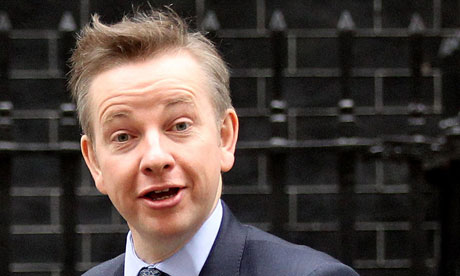Michael Gove's A-level proposal will return us to the days when only the privileged were likely to go to university

Gove, ‘who advocates rote-learning of
poems and kings and queens of England, has always had a narrow
conception of education'. Photograph: Oli Scarff/Getty
So Michael Gove, the education secretary, wants to give more power to academics at "top universities". This should be thrilling news, since coalition policy is swiftly morphing universities into business-driven degree mills, with lecturers feeling more powerless than they have in decades. Yet Gove's invitation to us to set A-levels has not set pulses racing. Few lecturers think A-levels in their present form prepare students well enough for university, or equip them to engage intelligently with the challenges of a complex world. A rethink would ordinarily be welcome. But this proposal will not achieve what it sets out to do.
Education cannot be overhauled in this typically top-down manner, with a select minority of institutions running the show at the expense of the sector as a whole. Like much else that characterises coalition higher education policy, this is a form of class warfare. A rigorous and challenging education is not magically effected simply by setting tougher questions or more essays – much as the modular answers of A-levels at present are to be deplored.
An equal opportunities education requires systemic attention and proper public funding, quite the opposite of coalition priorities. Critical thinking, intellectual curiosity and good writing must be taught from an early age, and made part of every citizen's skills. Gove's suggestion reduces them to instruments for enabling the better-supported to get into a good course. Turning A-levels into old-style Oxbridge entrance exams is consistent with the coalition's damaging and hierarchical attitude to education. Only a handful of well-coached clever clogs will enter a shrinking and expensive university sector.
Gove's proposal to limit the number of retakes also requires scrutiny. As any teacher knows, one-off exam results are not a fail-safe indicator of a student's abilities. Gove's emphasis on them as limited-opportunity tools for determining university entrance highlights the coalition's refusal to see education as a democratic necessity, a resource that should be widely and equally available as a public good.
While it would be productive for schoolteachers and academics across the sector to share ideas about the content and evaluation of school curriculums, it is wrong to suggest that exams can be set by people not directly involved with the teaching of them. At Cambridge we spend much attention on ensuring that the exams we set are fair and enable a wide range of answers in relation to the teaching we provide, but the questions are not instrumental – nor do we teach solely with exams in mind. Schoolteachers, not lecturers, should be the driving force behind A-levels. What Gove calls "university ownership" of A-levels is a euphemism for the managerialism that is already part of the problem. Asking some universities to "drive the system" from a distance threatens to throw everyone else off the vehicle.
Our challenging times call for a richly resourced educational system that equips young people across social classes to develop their intellectual and creative abilities. Jobs and degrees are vital – but so, in a democracy, is the ability to think ideas through at length, make informed judgments, critically evaluate alternatives and argue a case. Would a government that is busily pushing through changes with no real mandate really want to encourage this?
Gove, who advocates rote-learning of poems and kings and queens of England, has always had a narrow conception of education. His proposal returns us to the bad old days when only the privately educated and well-funded could go to university. In tandem with tripled tuition fees, a funding regime that weakens the arts and humanities, and the likely privatisation of many universities, the already privileged will be the only winners.

No comments:
Post a Comment